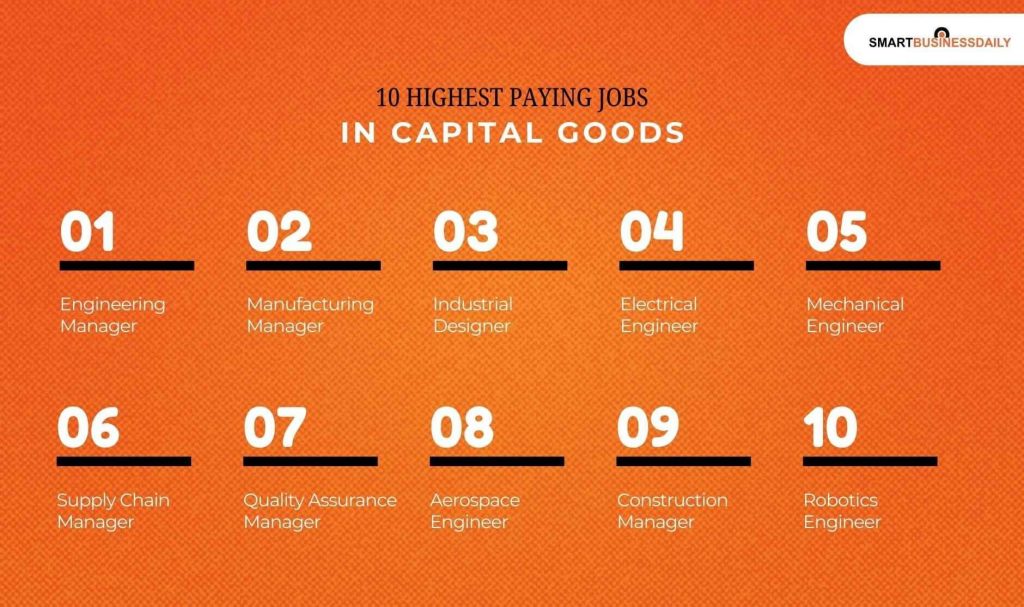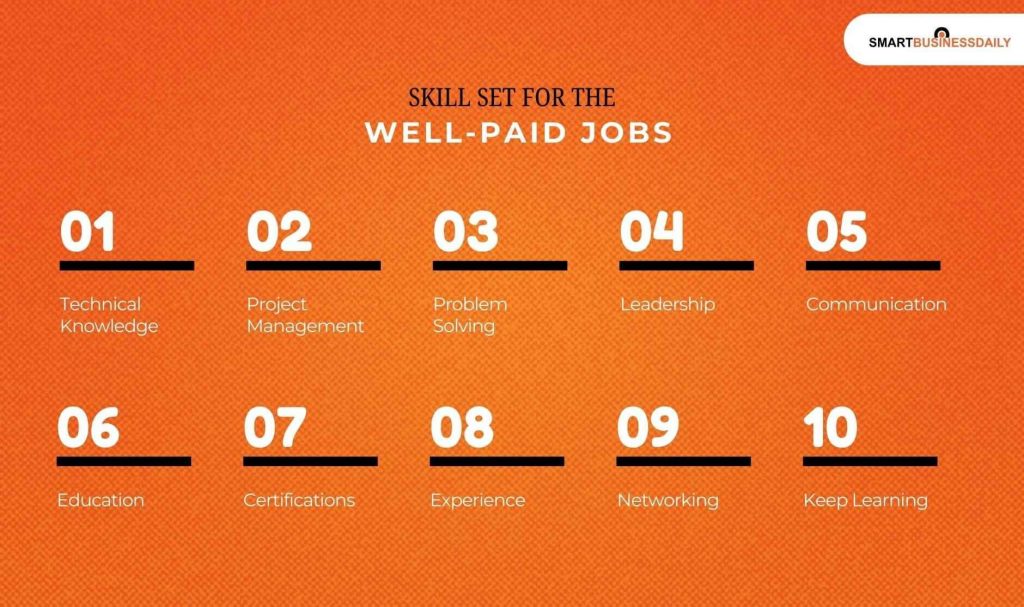Best Paying Jobs in Capital Goods: A Guide to Lucrative Careers in the Industry
9 Mins Read
2 comments
Published on: 05 March 2025
Last Updated on: 09 July 2025

- What Are Capital Goods?
- Why Work for Capital Goods?
- Top 10 best paying jobs in capital goods
- 1. Engineering Manager
- 2. Manufacturing Manager
- 3. Industrial Designer
- 4. Electrical Engineer
- 5. Mechanical Engineer
- 6. Supply Chain Manager
- 7. Quality Assurance Manager
- 8. Aerospace Engineer
- 9. Construction Manager
- 10. Robotics Engineer
- 11. Warehouse Worker
- 12. General Operations Manager
- 13. Fabricator
- 14. Machine Learning Scientist
- 15. Director Of Product Management
- 16. Director Of Research And Development
- 17. Metallurgical Engineer
- 18. Petroleum Geologist
- 19. Principal Research Associate
- 20. Quality Control Inspector
- What Are The Skills Required For The Best Paying Jobs In Capital Goods?
- Starting a Career in Capital Goods:
- Best Paying Jobs In Capital Goods: Choose The Best One Now!
Are you looking for the best paying jobs in Capital goods? Then you have landed on the right page!
The capital goods industry manufactures important machinery, equipment, and infrastructure, without which other industries cannot make products.
Capitalism provides millions of job opportunities, some of which offer competitive compensation, secure employment, and opportunities for career advancement.
When you know which Capital Goods jobs have the highest salaries, it helps one plan one’s future well.
This article discusses in detail some of the best paying jobs in capital goods that has created, including salary, job responsibilities, and the necessary skills and qualifications required to advance up the corporate ladder.
What Are Capital Goods?

Capital goods are tangible assets owned by a firm that are used to produce a commodity for final consumption by customers. Capital goods encompass machinery, tools, buildings, vehicles, and similar items.
They are unlike consumer goods in that they are used more or less in major capital investments rather than consumed on an instant basis.
Manufacturing, construction, aerospace, and power generation are highly capital-intensive industries with a considerable degree of sophistication and economic importance, as they provide high-paying job opportunities for talented personnel.
Why Work for Capital Goods?
Working in the capital goods industry offers you a diverse career paths, a good competitive salaries as well as the opportunities which is continuously evolving due to technologies and innovations.
This sector is relatively stable as there is a continuous need for capital goods to operate, no Matter what the economic condition is!
Capital goods found security in the competitiveness of nearly every sector.
- Renowned for high salaries: Most appointments are for high-paying and even six-figure roles.
- Room for Career Advancement: There is ample opportunity for career advancement.
- Depth of Choice: The industry comprises several sectors and diverse career paths.
Top 10 best paying jobs in capital goods

Here are some high-paying jobs in capital goods, along with their details.
1. Engineering Manager

The engineering managers associate production and design with construction development functions. They lead their teams and build projects at the same time, ensuring product quality and efficiency.
| Average Salary | $120,000 – $170,00 |
| Required Skills | Leadership, problem-solving, project management, and technical expertise. |
| Education | A bachelor’s or master’s degree in engineering or a related discipline. |
2. Manufacturing Manager
Manufacturing managers are responsible for ensuring that production facilities operate efficiently within budget and run smoothly for the production staff.
| Average Salary | $100,000 – $130,000 |
| Required Skills | Process optimization, quality control, and team management. |
| Education | An industrial engineering, business management degree, or any related field. |
3. Industrial Designer
Industrial designers create products and establish the methods for manufacturing them, making them more effective and beautiful.
| Average Salary | Around $80,000-$110,000 a year |
| Required Skills | Creativity, CAD software proficiency, and engineering-related knowledge. |
| Education | Degree in industrial design or mechanical engineering. |
4. Electrical Engineer
Electrical engineering involves designing, developing, and maintaining electrical systems for various applications, including machinery, factories, and infrastructure.
| Average Salary | $90,000 to $120,000 Per Year |
| Required Skills | Circuit design, problem-solving, and analytical skills. |
| Education | B.Sc. in electrical engineering. |
5. Mechanical Engineer

Mechanical engineers design machines and mechanical systems that are less energy-efficient and less durable; they are responsible for this.
| Average Salary | $85,000-$115,000 per Year. |
| Required Skills | Math, physics, CAD. |
| Education | Bachelor’s in mechanical engineering. |
6. Supply Chain Manager
This includes some internal controls, where processes for procurement and logistics are monitored until third parties ensure distribution.
| Average Salary | $95,000-$130,000 every Year. |
| Required Skills | Logistics planning, vendor management, and negotiation. |
| Education | Degrees in supply chain management, business, or engineering. |
7. Quality Assurance Manager
QA Managers help ensure that products are safe and meet quality standards once they are released to marketing.
| Average Salary | $85,000-$115,000 per Year |
| Required Skills | Quality system techniques, compliance knowledge, and problem-solving. |
| Education | Quality management, industrial engineering, or any related area. |
8. Aerospace Engineer
Aerospace engineers design aircraft, spacecraft, and associated components. It’s one of the highest-paying jobs in capital goods.
| Average Salary | $100,000-$140,000 every Year. |
| Required Skills | Aerodynamics, physics, and problem-solving. |
| Education | Bachelor’s or master’s degree in aerospace engineering. |
9. Construction Manager
Construction Managers manage the site assessment, including timelines, budgets, and quality measurement during execution.
| Average Salary | $90,000-$130,000 per annum |
| Required Skills | Project Management, budgeting, and leadership. |
| Education | Requires a degree in construction management, civil engineering, or architecture. |
10. Robotics Engineer

Robotics engineers design, test, and maintain robots intended for automation, manufacturing, or logistics.
| Average Salary | $100,000-$140,000 a year |
| Required Skills | Programming, mechanical engineering, modeling, and AI knowledge. |
| Education | Bachelor’s degree in a relevant field, like electrical, mechanical, computer engineering, or even a dedicated program of robotics engineering. |
11. Warehouse Worker
A Warehouse Worker is responsible for a variety of tasks related to the movement, storage, and organization of goods.
They manage these goods within a warehouse or distribution center.
| Average Salary | $38,000 to $46,000 a year |
| Required Skills | Physical stamina, attention to detail, and the ability to work effectively within a team. |
| Education | High school diploma or GED as their educational foundation. Some employers prefer candidates with an associate’s degree in logistics or related fields |
12. General Operations Manager
A General Operations Manager oversees the day-to-day operations of an organization, ensuring efficiency, productivity, and alignment with company goals.
| Average Salary | $76,000 to $129,000 a year |
| Required Skills | Strategic planning, problem-solving, financial management, and the ability to lead and motivate teams. |
| Education | Bachelor’s degree in a related field, such as business administration, management, or a specialized area like supply chain management |
13. Fabricator
A fabricator’s job role revolves around transforming raw materials, primarily metal, into finished products or components according to specifications.
| Average Salary | $37,000 to $70,000 a year |
| Required Skills | Blueprint reading, welding, and proficiency with various fabrication tools and machinery. |
| Education | High school diploma or GED, followed by on-the-job training or vocational training, and potentially an apprenticeship |
14. Machine Learning Scientist
If you are working as a Machine Learning Scientist, you focus on researching and developing algorithms and models.
These models will enable machines to learn and make decisions from data.
| Average Salary | $165,000-$210,000 a year |
| Required Skills | Strong programming abilities (especially in Python), a deep understanding of mathematics and statistics, expertise in machine learning algorithms and deep learning techniques, and proficiency in data handling and preprocessing. |
| Education | A bachelor’s degree in a related field is often the starting point, followed by advanced studies like a master’s or Ph.D. for specialized roles or research-focused positions. |
15. Director Of Product Management

I think this one is a very lucrative job role. A Director of Product Management leads a team that creates products.
They work closely with sales, marketing, manufacturing, and customer service teams to ensure everything runs smoothly.
| Average Salary | $157,000 a year |
| Required Skills | Data analysis, business development, and communication skills business development. |
| Education | Bachelor’s degrees, and many have master’s degrees in a related field. |
16. Director Of Research And Development
A Director of Research & Development (R&D) creates or improves products or services to meet specific customer needs.
R&D leaders manage the design, testing, production, and marketing of these products.
| Average Salary | $135,000 a year |
| Required Skills | The ability to accurately forecast sales, conduct interviews, and deliver presentations. |
| Education | 10 years of relevant experience, an advanced degree and the ability to manage people. |
17. Metallurgical Engineer
A metallurgical engineer focuses on the science and engineering of metals and alloys, including their production, properties, and applications.
They work to develop and improve metal-based materials for various industries like aerospace, automotive, and construction
| Average Salary | $77,500 and $108,500 a year |
| Required Skills | Solid understanding of materials science, metallurgical principles, and relevant manufacturing processes. |
| Education | A bachelor’s degree in metallurgical engineering or a related field like materials science or chemical engineering |
18. Petroleum Geologist
A Petroleum Geologist’s primary job role is to find and extract oil and natural gas resources.
They utilize their geological expertise to locate potential petroleum reservoirs, assess their viability, and guide drilling operations for efficient and safe extraction of petroleum.
| Average Salary | $53,500 to $135,500 a year |
| Required Skills | A strong foundation in geological principles, coupled with specialized skills in data analysis, interpretation, and subsurface exploration. |
| Education | A strong educational foundation in geology, often with a master’s degree or even a Ph.D., plus specialized knowledge in petroleum-related areas like seismic interpretation |
19. Principal Research Associate
A Principal Research Associate typically leads and manages research projects, contributing to the design, execution, and analysis of studies
| Average Salary | $147,843 and $190,966 a year |
| Required Skills | A strong foundation in research methodologies, data analysis, and communication, alongside leadership and project management skills |
| Education | A Master’s or Doctoral degree in a relevant field, along with significant research experience. |
20. Quality Control Inspector

A Quality Control (QC) Inspector ensures that products or services meet established quality standards and specifications.
| Average Salary | $47,460 a year |
| Required Skills | Attention to detail, strong communication, problem-solving, and analytical skills |
| Education | A high school diploma or equivalent for entry-level positions |
What Are The Skills Required For The Best Paying Jobs In Capital Goods?

In the capital goods skills, those who would hone skills such that they can be accepted into the capital goods sector will include:
- Technical Knowledge: Some of these relate more closely to the knowledge component of engineering principles and machines.
- Project Management: Larger projects are initiated and closed.
- Problem Solving: Coming up with an extraordinary solution along with technical constructs.
- Leadership: Efficiently managing teams and operations.
- Communication: Explaining technical issues to stakeholders.
- Manufacturing processes: A deep and detailed understanding of te manufacturing processes, better quality control and machining is very crucial.
- Data analysis: A better understanding of data analysis and data science that can help to optimize the processes and make further informed decisions.
Starting a Career in Capital Goods:
- Education: The majority of them are degree holders.
- Certifications: Specialization certifications like PMP (Project Management Professional) or Six Sigma will significantly enhance your credentials.
- Experience: Need to gain practical experience through internships or entry-level positions.
- Networking: Get connected with industry experts via LinkedIn and at related events and benefit from new job openings.
- Keep Learning: Updates on industry trends and technologies ensure further career advancement.
Best Paying Jobs In Capital Goods: Choose The Best One Now!
The capital goods industry is vested with several good jobs. Professions will depend on the type of work sought and experience, including engineering, design, management, and logistics. The higher-paying occupations would have secured the individual financially and on the career ladder.
Whether you are just commencing or planning a career switch, this is very rewarding decision. Capital goods careers are among the best-paying jobs in the current world.
In turn, they will always remain near the top of the preference list for professionals seeking a long-term career, as they offer competitive salaries, stability, and innovation.
If you really want to have the best paying jobs in capital goods, then this is the correct time to sharpen your skills and qualifications to enter this high-paying, dynamic market.



















2 comments
Rosalee March 5, 2025 at 9:47 am
Thank you for the auspicious writeup. In fact was a amusement account it Look advanced to far.
Roever March 18, 2025 at 12:54 am
Simply desire to say your article is as surprising. The clearness to your submit is just excellent and i can assume you're an expert on this subject. Well with your permission let me to grasp your feed to keep updated with approaching post. Thank you 1,000,000 and please keep up the gratifying work.